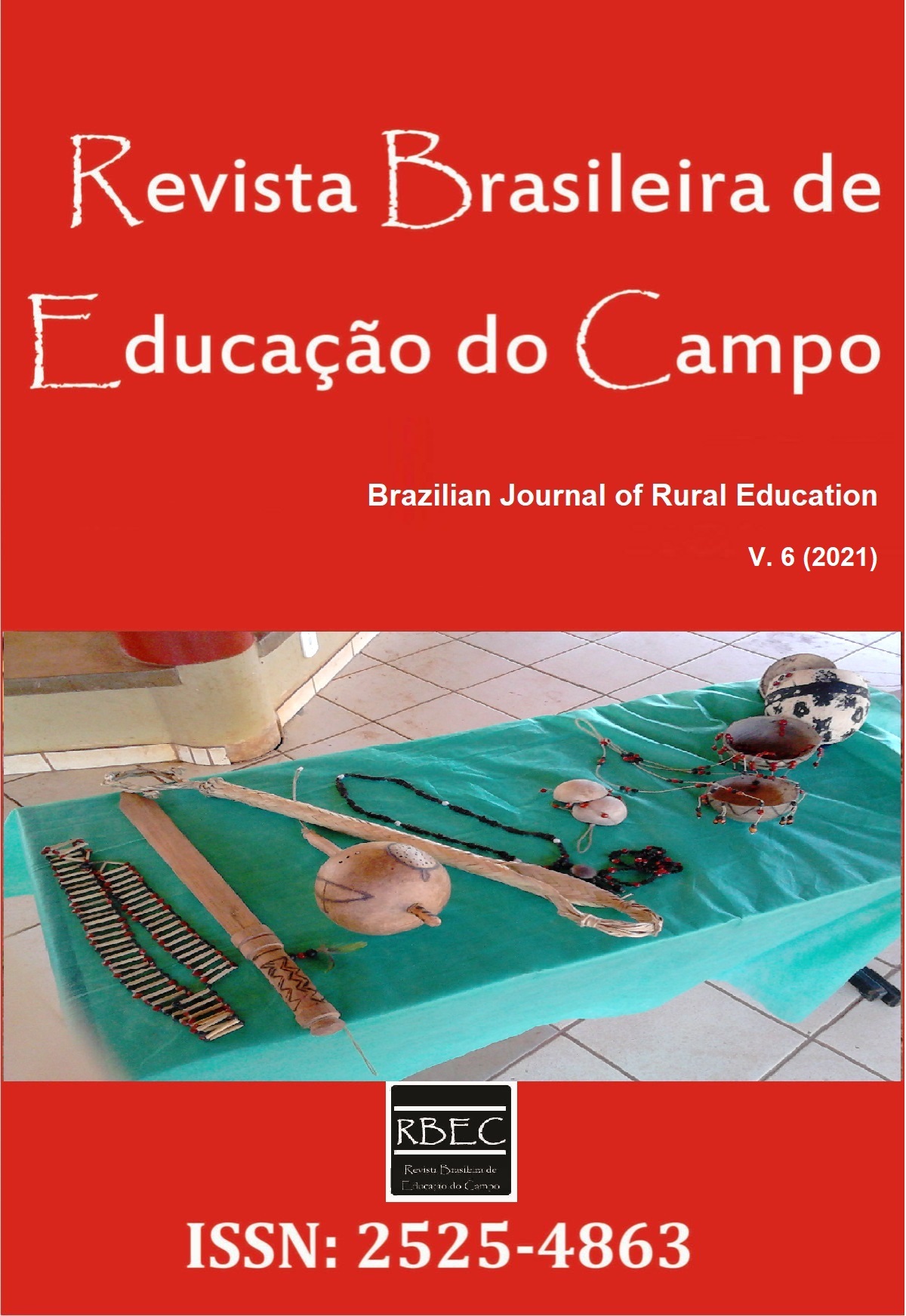Alumnae from the Undergraduate Rural Education: paths in changing of the School Shape
DOI:
https://doi.org/10.20873/uft.rbec.e12756Abstract
ABSTRACT. This study analyzed the practices of alumnae from the Undergraduate Rural Education Program (LeCampo) at Minas Gerais University (local acronym FaE/UFMG). It aims at contributing to discussions on changes in school shape. The analysis was based on theoretical and methodological debates about Rural Education, Socialist and Freirean pedagogy. Data were obtained from qualitative research which comprised document analysis, interviews, and participative observation. Results show significant steps taken towards changing school shape. This movement was produced by the alumnae and the education institutions in which they work. Schools develop projects that allow inserting the student in their environment, with a view to criticizing them, understanding social, cultural and work relations and, thus, aiming at an omnilateral education. The conclusion was that these changes cause most effective transformation when the alumnae are engaged in social movements and rural unions that encourage and support the alumnae’s pedagogical practices, which, in turn, stimulates the alumnae to be more deeply engaged in these movements.
Downloads
Literaturhinweise
Caldart, R. S. (2001). O MST e a formação dos sem terra: o movimento social como princípio educativo. Estudos Avançados, 15(43), 207-224. https://doi.org/10.1590/S0103-40142001000300016
Caldart, R. S. (2010). Licenciatura em Educação do Campo e projeto formativo: qual o lugar da docência por área? In Caldart, R. S., et al. (Orgs.). Caminhos para transformação da escola: reflexões desde práticas da licenciatura em Educação do Campo (s./p.). São Paulo: Expressão Popular.
Caldart, R. S. (2015). Caminhos para transformação da escola. In Caldart, R. S., Stedile, M. E., & Daros, D. (Orgs.). Caminhos para transformação da escola: agricultura camponesa, educação politécnica e escolas do campo (s./p.).. 1. ed. São Paulo: Expressão Popular.
Fernandes, B. M., & Molina, M. C (2004). O campo da Educação do Campo. In Molina, M. C., & Jesus, S. M. S. A. (Orgs.). Contribuições para a construção de um projeto de Educação do Campo. Coleção por uma Educação do Campo, n. 5. (pp. 53-90). Brasília: Articulação Nacional Por uma Educação do Campo.
Freire, P. (2011). Educação e mudança. Trad. Lilian Lopes Martin. 2ª ed. rev. e atual. São Paulo: Paz e Terra.
Freire, P. (2016). Pedagogia do Oprimido. 60ª ed. Rio de Janeiro: Paz e Terra.
Freitas, L. C. (2009). A luta por uma pedagogia do meio: revisitando o conceito. In Pistrak, M. M. (Orgs.). A Escola-Comuna (s./p.). São Paulo: Expressão Popular.
Freitas, L. C. (2010). Avaliação: para além da “forma escola”. Educação: Teoria e Prática, 20(35), 89-99.
Gramsci, A. (2006). Cadernos do Cárcere, Volume 2: Os Intelectuais. O Princípio Educativo. Jornalismo. 4 ed. Tradução de Carlos Nelson Coutinho. Co-edição de Luiz Sérgio Henriques e Marco Aurélio Nogueira. Rio de Janeiro: Civilização Brasileira.
Molina, M., & Sá, L. M (2012). Escola do Campo. In Caldart, R., Pereira, I. B., Alentejano, P., & Frigotto, G. (Orgs.). Dicionário da Educação do Campo (pp. 326-333). Rio de Janeiro, São Paulo: Escola Politécnica de Saúde Joaquim Venâncio, Expressão Popular.
Projeto Político Pedagógico/PPP. (2008). Licenciatura em Educação do Campo. Universidade Federal de Minas Gerais. Faculdade de Educação.
Rouxel, A. (2013) Aspectos metodológicos do ensino da literatura. In Dalvi, M. A., Rezende, N. L., & Jover-Faleiros, R. (Orgs.). Leitura de literatura na escola (pp. 17-33). São Paulo: Parábola.
Silva, M. S. (2018). O movimento da educação do campo no Brasil e seu diálogo com a educação popular e a pedagogia decolonial. Cadernos de Pesquisa: Pensamento Educacional, 13(34), 77-94. https://doi.org/10.35168/2175-2613.UTP.pens_ed.2018.Vol13.N34.pp77-94
Vicent, G., Lahire, B., & Thin, D (2001). Sobre a história e a teoria da forma escolar. Educação em Revista, 33, 7-47.
Whitaker, D. C. A., & Antuniassi, H. R. (1993). Escola pública localizada na zona rural: contribuições para sua estruturação. Cadernos Cedes, 33, 9-42.
Zarref, L. (2018). Agroecologia e o MST. MST. Recuperado de: http://www.mst.org.br/2018/10/24/agroecologia-e-o-mst.html.
Veröffentlicht
Zitationsvorschlag
Ausgabe
Rubrik
Lizenz
Creative Commons Attribution License
Creative Commons Attribution License
Proposal for Copyright Notice Creative Commons
1. Policy Proposal to Open Access Journals
Authors who publish with this journal agree to the following terms:
A. Authors retain copyright and grant the journal right of first publication with the work simultaneously licensed under the Creative Commons Attribution License that allows sharing the work with recognition of its initial publication in this journal.
B. Authors are able to take on additional contracts separately, non-exclusive distribution of the version of the paper published in this journal (ex .: publish in institutional repository or as a book), with an acknowledgment of its initial publication in this journal.
C. Authors are permitted and encouraged to post their work online (eg .: in institutional repositories or on their website) at any point before or during the editorial process, as it can lead to productive exchanges, as well as increase the impact and the citation of published work (See the Effect of Open Access).














